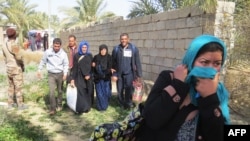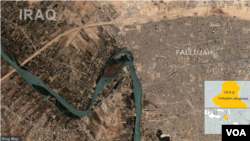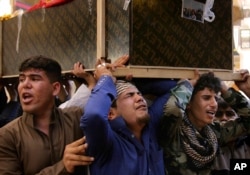Thousands of families trapped between Islamic State extremists and Iraqi forces in the city of Fallujah are being forced to eat rotten food and soup made of grass.
Reports from inside the city say children are starting to die as families run out of milk and milk powder and can only feed their infants water with sugar. Mothers are suffering from malnutrition. It is also being reported that even when food is available, one kilogram of rice now costs about $40 and a 50-kilo bag of flour costs $800.
Christoph Wilcke, Iraq researcher for Human Rights Watch, told VOA on Tuesday the situation is at an impasse.
“The government of Iraq is not letting anything into the city of Fallujah, including food or medicine, and IS is not letting anybody out,” he said.
Limited cash flow
Residents are running out of money. IS reportedly has stopped all cash transfers and threatened to kill anyone receiving external help.
Medicine for chronic illnesses is in short supply as well.
Emergency help is just outside the city.
“Food, water, and female hygiene kits are on standby for delivery if and when the city becomes accessible,” Dina El-Kassaby of the World Food Program told VOA.
El-Kassaby said an estimated 50,000 civilians are trapped in the city without access to basic services.
Food shortage
Data collected in March showed that “shops and markets had exhausted all food supplies, including wheat, sugar, rice, vegetable oil and lentils,” El-Kassaby added.
By then, people were reportedly surviving off potatoes, lettuce and eggplants.
“UNHCR deplores tactics that put innocent civilians at risk of serious harm during conflict situations,” Bruno Geddo, the UNHCR representative in Iraq, said Tuesday. “These tactics, sadly, are not new and have been used, with devastating consequences, in Syria.”
Siege warfare also has been used in Iraq, such as when Islamic State militants trapped thousands of civilians on Sinjar mountain in 2014.
Casualties
Dozens of civilians in Fallujah are reported to have been wounded or killed in airstrikes as well as in ongoing shelling between IS and Iraqi military personnel backed by Popular Mobilization Forces militia.
Once the roads to Fallujah are opened, humanitarian agencies are ready to move in and supply aid. For example, UNHCR - the U.N. refugee agency, has emergency stocks in Baghdad that it can quickly move the 58 kilometers to Fallujah.
Held by IS extremists since 2014, the traditionally tribal Sunni city of Fallujah has been completely surrounded by Iraqi security forces since February. The last major transport route to the city was closed on January 28, cutting off access to all basic needs.
In late March, the Iraqi government informed the U.N. that it intended to open safe corridors to let civilians leave the city.
“If residents are able to leave via one of these routes, UNHCR is setting up internally displaced persons camps with capacity to shelter up to 1,000 families,” Geddo said.
No way out
Reports from Fallujah say that since early April, no families have managed to escape using the government-designated safe corridors. There are reports that IS is using loudspeakers in mosques to tell residents that if they leave, they will be severely punished by Iraqi forces.
Some families have attempted to be smuggled out of the city using a river route at night – at the cost of $3,000 per person. Around 20 families are reported to have left via that route.







